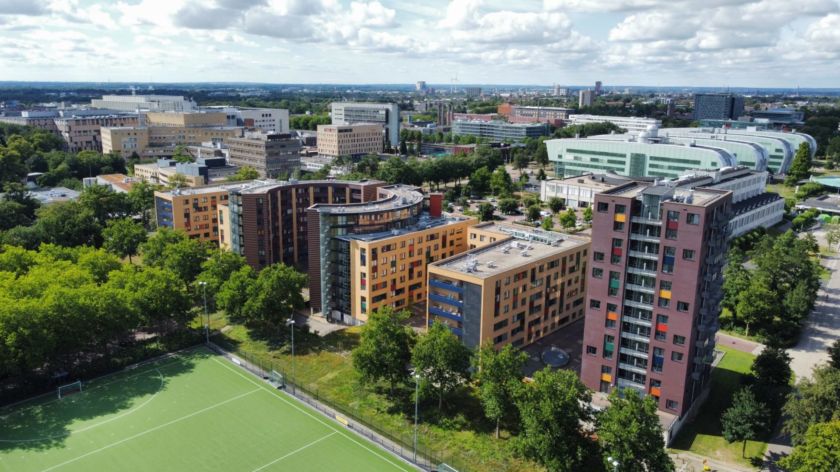Heating of SSH& complex Sterrenbosch to be provided by the university in the future
-
 Sterrenbosch. Foto: Johannes Fiebig
Sterrenbosch. Foto: Johannes Fiebig
Next year, SSH& housing complex Sterrenbosch will be connected to the sustainable heating system of Radboud University. By then, gas will hardly be needed in the houses. An added benefit for students, according to SSH&: the housing costs will go down.
In order to heat and cool part of its buildings, Radboud University makes use of so-called aquifer thermal energy storage (ATES). When buildings are cooled, heat is released which is used to heat other buildings (for a detailed explanation, watch the video below). This way, gas consumption on the campus has been reduced considerably in recent years.
Next year, the residents of SSH&’s Sterrenbosch complex on the Platolaan will also be heating their homes with this sustainable source of heat. ‘The building is on university grounds, so it would be stupid not to take advantage of this opportunity’, says SSH& director Kees Stunnenberg. In line with the ambition of the municipality of Nijmegen, SSH& wants to be CO2 neutral by 2045.
According to Stunnenberg, connecting to the network is relatively simple because the houses are already heated via a central boiler room – residents do not have their own boiler. The new heat pumps needed for the connection do require a lot of energy, but this can be generated by solar panels on the roof. Not much needs to be done in the flats themselves; only the shower tap will be replaced by a thermostatic tap (a tap with which you can adjust the temperature).
Saving
According to SSH&’s calculations (based on energy prices in 2021), tenants in Sterrenbosch will save around 160 euros a year on their housing costs. ‘With current energy prices, the savings would be even greater’, says Stunnenberg.
Because the building will have a better energy label, the rent for future tenants could go up. But that will never be as much as the costs saved by connecting to the ATES, says the SSH& director. In the end, future tenants will also save money.
Signatures
By law, the student housing corporation needs the consent of at least 70 percent of the tenants of the complex in order to be able to make the connection to the university’s ATES. In February, the tenants were therefore asked via email to provide a digital signature. The required percentage was only achieved at the end of June.
‘Tenants first weigh up their own interests’
‘We had hoped that this would go quicker’, Stunnenberg admits. ‘We could have started this summer. Now the connection will be postponed until the summer of 2023. The work can only take place in the warmest season, because residents will temporarily be without heating.’
‘Students almost all consider sustainability to be important’, Stunnenberg continues. ‘But with an intervention like this, tenants first weigh up their own interests. They only live there for a short time and there will be some inconvenience anyway. If they’ve just entered an exam period, they might think: not now. I completely understand that.’
Note
Resident Dries van Rens, who graduated as a business administrator at the end of last year, knows that not everyone was immediately enthusiastic about making the building more sustainable. He shows a note that was hanging in Sterrenbosch: “Wait and first ask the SSH& for clarity about compensation for the inconvenience! As a tenant, you have a right to that!”
What does Van Rens think of the note? ‘Sad. We should embrace this kind of initiative. Moreover, the increase in sustainability has a positive effect on residents. Now that energy costs have risen so much, it’s a nice bonus that our housing costs are going down.’



